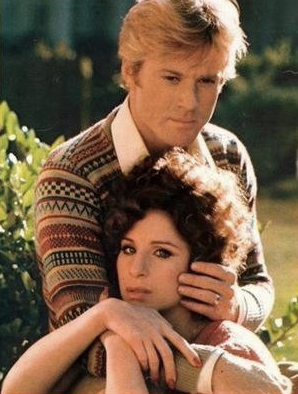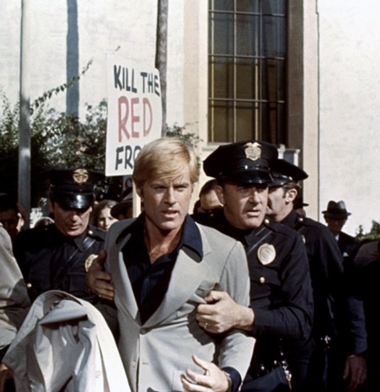
 |
|
|
|
The Way We Were remains one of Barbra Streisand's most popular pictures. It wants to be many things but best succeeds as a high-end vehicle for its leading lady, the talented powerhouse who conquered most every career challenge available in show business. This was Barbra's penultimate commitment to producer Ray Stark, so it was difficult to find a script that was both commercial enough for him and challenging enough for her. The original screenplay by Arthur Laurents has autobiographical aspects, and embraces a "daring" theme dear to the New Liberals of the '70s Hollywood establishment: the hot-button topic of the Hollywood Blacklist. Woody Allen's The Front (coming next February from Twilight Time) may have been the next blacklist-themed major release, and that was several years later. After six years in movies and wielding impressive clout, Streisand made most of the major personnel decisions on the picture, not just the choice of cameraman, Harry Stradling Jr.. Streisand wanted Sydney Pollack, and through him enlisted as her co-star the ideal male heartthrob of the moment, Robert Redford. The creative infighting between Pollack, Redford and Streisand turned the making of The Way We Were into a high-powered Hollywood battleground. 
Arthur Laurents' screen story was almost abandoned in re-writes, yet mostly reinstated before filming began. Eastern college girl Katie (Streisand) is a Red-sympathizing college activist who becomes infaturated with a white-bread Adonis, aspiring writer Hubbell (Redford). He barely notices her. Years later during the war Katie is an energetic contributor to the war effort and FDR's social programs. She finds Hubbell in a white Naval uniform drinking in a bar, and takes him to bed. Katie encourages Hubbell to live up to his potential. They eventually marry and move to Hollywood, where Hubbell's influential friends find him studio screenwriting work. Katie has dropped her political activities, but when the Cold War witch hunts begin she feels the need to take a stand. Hubbell doesn't see what's to be gained by getting involved. He strays and Katie gets pregnant. Katie decides that their relationship is doomed by politics and just plain fate. The Way We Were was sold in glamorous 1940 fashion, as a stellar collision of the romantic personalities Streisand and Redford. Like almost all Barbra Streisand movies, the focus never leaves the star. One of Redford's complaints was that the Hubble character is functionally passive, a supporting part. As is nicely pointed out in the disc's commentary, Redford is the glamorous sex object, while the film belongs firmly to Streisand. Career-wise the movie is indeed a Streisand triumph, in that Redford is no Omar Sharif or Ryan O'Neal, but a equally bankable top-rank star. And like those other actors, he's playing George Brent to Streisand's Bette Davis. The Way We Were tells its story from the woman's POV, or better, the Streisand POV. Katie initiates most everything that happens -- meeting, having sex, taking a stand and breaking up. Even as an insecure student humiliated because her writing isn't praised, Katie is clearly a woman of great courage and commitment. Arthur Laurents certainly knew how to write to Streisand's strengths -- as well as her requirements. 
The glamour is certainly there; viewers still swoon over the image of Streisand brushing Redford's golden hair off his forehead. He's the beauty object and she's the Woman For All Seasons. In 1973 most viewers hadn't yet encountered a scene in which a woman makes love to a near-unconscious, inebriated man -- it's funny because it's very likely a common experience for many women. Just the same, in its middle section the movie begins to fragment somewhat, with the story getting lost amid montages of sailboats and fireside lovemaking. Sometimes we forget if the war is over or what exact year it is. The 1950s sneak up on us unawares. The filmmakers get an A+ for conjuring up an old-fashioned romantic tearjerker packed with noble suffering and bittersweet sacrifices. Aided by the engaging title song, they even pull off a romantic coup with what should be a humiliating final scene. Perennial smoothie Hubbell has taken the easy path ever since college, and shows no sign of having worked up a sweat from breaking with Katie. Several years later they meet on the street, and we're supposed to think it a defining moment in the travails of the human heart -- secretly, he still loves her! I'm afraid I still see Hubbell as a writing hack who has taken special care to avoid excess drama in his life. He dishes out an ingratiating smile (which has apparently been his Golden Ticket throughout) and gives Katie a gentle brush-off. That The Way We Were turns this into a meaningful scene for Katie is remarkable. |
|||||||||||||||||||
Review Staff | About DVD Talk | Newsletter Subscribe | Join DVD Talk Forum
Copyright © MH Sub I, LLC dba Internet Brands. | Privacy Policy
Subscribe to DVDTalk's Newsletters
|